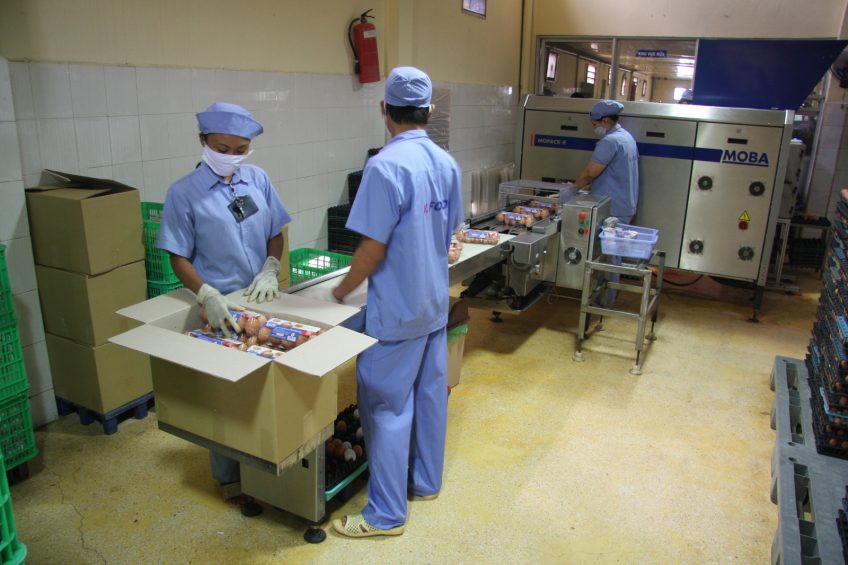Variety in eggs is key in Vietnam

Like everywhere in Asia, egg consumption is also on the increase in Vietnam. Apart from chicken eggs, also quail and duck eggs are popular, as well as typical traditional egg products. That demands applied grading and packing. V. Foods and Ba Huan are specialists in this field.
By Ad Bal
Table eggs are popular food in Vietnam, but not just the regular layer chicken (brown is an Asian favourite), also duck eggs have a prominent place on the menu. There’s a market for fresh duck eggs, but also for so called “half hatched” duck eggs. This is truly a popular delicacy all across Asia and in Vietnam in particular. After the eggs have been collected, they are placed in a special kind of incubator.
There they are hatched up to 18 days, after which they are ready for consumption. Apparently the half developed embryo is what gives the special taste to the egg. Moreover there’s the so-called “salted egg”, which is also a processed duck egg product. After being collected, these eggs are soaked for no less than 30 days in a kind of brine which is based on burned rice straw in salted water. After 30 days the eggs are “harvested” and sold. Particularly the yolk is then used for “moon cake”. These salted duck eggs can subsequently be processed and covered, either with charcoal or rice hulls. Then they are packaged and sold, individually or in packs. To a lesser extent, there is also a fair market share for quail eggs in Vietnam.
Professional processors
Ho Chi Minh City (HCMC) has two professional packing stations fully focused on professional packing and marketing of regular table eggs, quail and duck eggs, and in addition the specialty half-hatched and salted egg products.
Ho Chi Minh City (HCMC) has two professional packing stations fully focused on professional packing and marketing of regular table eggs, quail and duck eggs, and in addition the specialty half-hatched and salted egg products.
A relatively small, but specialised and privately owned company is V. Food. “We produce a wide range of packed eggs for supermarkets and outlets in HCMC”, says general manager Truong Chi Thien of V. Food. “The majority of our production comes from chicken eggs, which are sourced from 10 contract layer farms outside HCMC. These have flocks, ranging from 30,000–50,000 hens. Moreover, we have contracted about 50 duck layer farms which have flocks of around 5,000 birds. Apart from that, we have a supply from a number of quail farms. We also pack eggs from a special domestic layer breed that lays small eggs.
For each of these various products we have different packaging materials and handling procedures. The greatest volume comes from commercial layers and for packing those eggs, we have a Moba Mopack-R packer line with a capacity of 30,000 eggs/hour. All the eggs are washed inline in a Kuhl washer. After candling, they are sanitised and eventually packed. On a daily basis, we produce about 300,000 eggs in plastic boxes which is quite a good capacity. But all the other products are mainly packed by hand. The salted eggs are sometimes even packed individually or in boxes of four. Altogether we can offer both regular and specialty products and hence serve a wide range of customers in HCMC.”
Expanding business
A bigger sized egg packing station is Ba Huan, just outside HCMC. This company is privately owned and managed by Mrs Pham Thi Huan. Ba Huan also mainly packs chicken eggs. But besides packing, they also grade the eggs into weight classes to meet the increasing demands of Vietnam’s supermarkets. For that purpose they invested in two Moba Omnia grading and packing machines. Initially they started using a machine with a 60,000 eggs/hour capacity. But when their business expanded they added another Omnia with a capacity of 120,000 eggs/h.
A bigger sized egg packing station is Ba Huan, just outside HCMC. This company is privately owned and managed by Mrs Pham Thi Huan. Ba Huan also mainly packs chicken eggs. But besides packing, they also grade the eggs into weight classes to meet the increasing demands of Vietnam’s supermarkets. For that purpose they invested in two Moba Omnia grading and packing machines. Initially they started using a machine with a 60,000 eggs/hour capacity. But when their business expanded they added another Omnia with a capacity of 120,000 eggs/h.
Ba Huan has their own layer farm with about 100,000 Hisex brown birds, which are all kept in cages. In addition, they have a number of contract farms to supply the table eggs.
Ba Huan also deals in duck eggs, both the regular as well as the specialty type, the half hatched and salted eggs. The regular duck eggs are graded and packed through the Omnia however. But for the specialty products, much manual labour is needed, such as individual fertility checking of the half hatched eggs.
Ba Huan produces its own plastic packaging for all their products including those that are used in the Omnia. All products are sold throughout Vietnam under the brand name of Ba Huan, or under private label of national supermarket chains.
Keeping machines filled
“We are well on track at Ba Huan”, says Mrs Pham Thi Huan. “But we keep searching to further improve our business, such as at the supply side. Currently, we have supply from contract farmers and from our own flock but we wish to get this even more in our own hands. Our external suppliers are all relatively small producers, so apart from the logistic side which includes transport movement of relatively small batches, we also have to contend with the variety in size and quality differences.
“We are well on track at Ba Huan”, says Mrs Pham Thi Huan. “But we keep searching to further improve our business, such as at the supply side. Currently, we have supply from contract farmers and from our own flock but we wish to get this even more in our own hands. Our external suppliers are all relatively small producers, so apart from the logistic side which includes transport movement of relatively small batches, we also have to contend with the variety in size and quality differences.
Moreover, we must keep our machines filled. For that reason, we will shortly build a new facility for 300,000 layers on an 18 hectare surface. With the facility built, we aim to get our own parent stock and build a hatchery. This might be too much for our own use, so we aim to sell the oversupply to other producers in the country. In doing so, we hope to become less dependant on the two sole large suppliers of layer birds in Vietnam. We have confidence in our brand and products and will continue to further strengthen our business. Not just in the HCMC area, but all across the country.”
Owner and managing director Mrs Pham Thi Huan of Ba Huan: “We will build a new layer facility to become less dependant on small sized external suppliers”.
MORE INFORMATION
Join 31,000+ subscribers
Subscribe to our newsletter to stay updated about all the need-to-know content in the poultry sector, three times a week. Beheer
Beheer











 WP Admin
WP Admin  Bewerk bericht
Bewerk bericht